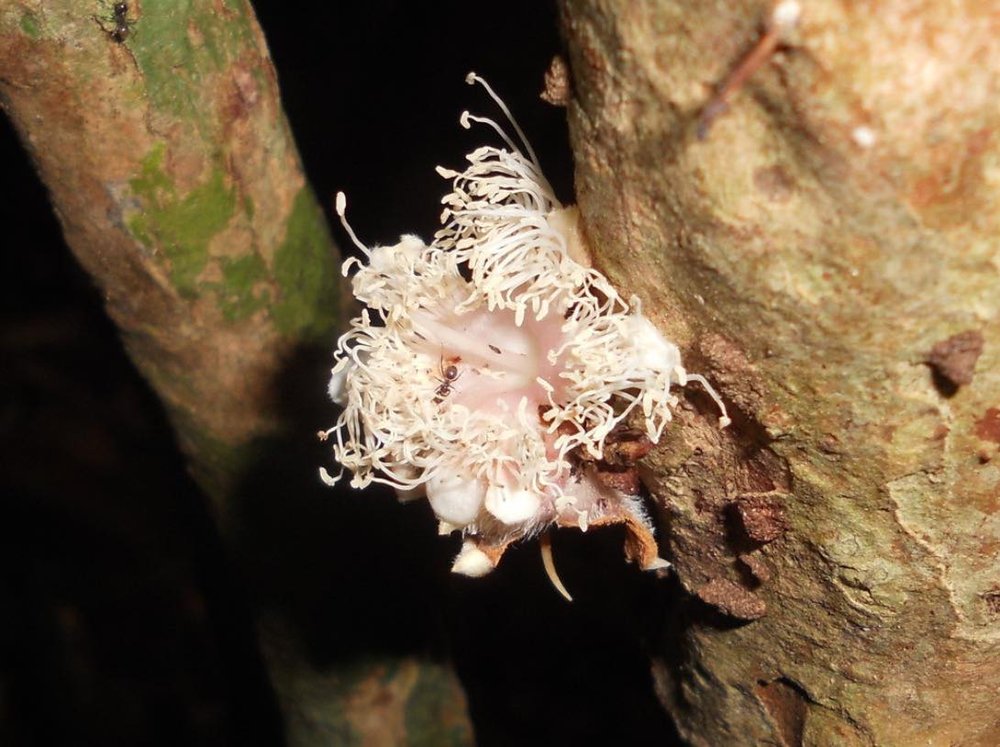Love it? Add to your wishlist
Your favorites, all in one place. Shop quickly and easily with the wishlist feature!
[message]
[title]
[message]



Veliyath Gardens
Couldn't load pickup availability
A Collector’s Dream and a Botanical Wonder from Bahia
Botanical Name: Plinia longiacuminata
Common Name: Pink Jaboticaba (Unofficial), Long Acuminate Jaboticaba
Among the lush Atlantic coastal forests of Itacaré in Bahia, Brazil, thrives one of the rarest and most visually captivating species of Jaboticaba – Plinia longiacuminata. Known for its elegant foliage and uniquely colored fruit, this plant is not just a botanical rarity, but a living representation of tropical finesse. It is still relatively unknown to mainstream horticulture, making it one of the most sought-after treasures for serious fruit collectors and exotic gardeners.
This plant is classified as a small to medium-sized tropical tree, typically reaching up to 6–7 meters in height. It prefers to grow beneath the canopy, indicating its natural tendency as an understory species. The tree exhibits:
Long, gracefully tapering leaves that are evergreen and finely textured
A sturdy but non-invasive trunk, with fruit appearing cauliflorously — directly on the bark
An aesthetic growth pattern ideal for ornamental gardens or premium exotic plant collections
Its manageable height and visual appeal also make it suitable for large containers in tropical or greenhouse environments.
The most arresting feature of Plinia longiacuminata is its fruit:
Appearance: Begins as light green, gradually turning into a delicate rosy pink upon ripening
Size: Larger than most Jaboticabas — offering generous pulp
Texture: Soft, juicy, and translucent with a delicate cling to the seed
Taste: Sweet, fragrant, and mellow — unlike the tartness often found in common Jaboticabas
Consumption: Best enjoyed fresh, straight from the tree, though it can be used in jams, liqueurs, or lightly chilled fruit salads
The pink hue makes it a visually arresting fruit and a rare find for any gardener interested in color diversity.
Though native to Brazil, especially along the Atlantic coast, its distinct qualities are gaining appreciation in:
Costa Rica and Panama, where collectors are trialing it in high-humidity zones
Parts of Southeast Asia, in protected tropical collections
India, now being introduced by rare plant nurseries like Veliyath Gardens, bringing this marvel to South Asian fruit enthusiasts for the first time
In these regions, it's not just valued as a fruiting plant, but also as a conservation piece — helping preserve lesser-known species in cultivated form.
Though specific studies on Plinia longiacuminata are still emerging, its close relation to other Plinia species suggests similar health-boosting properties:
Rich in antioxidants — especially anthocyanins and polyphenolic compounds
Supports immune system health with its vitamin C content
Good for digestion due to its fiber-rich pulp
Anti-inflammatory in traditional use
Low in natural sugars, making it safe for moderate consumption in diabetic diets
Consuming this fruit regularly, even in small quantities, can support cellular health, reduce free radical damage, and improve overall vitality.
While not extensively documented in indigenous texts, the fruit has garnered admiration among rural communities in Bahia. Families often treat it as a special harvest, enjoyed fresh during seasonal gathering. With its sweet, perfume-like pulp, it’s considered a festive fruit — gifted or shared in community circles when available.
Today, as interest grows in native Brazilian fruits, Plinia longiacuminata is beginning to find its place in boutique culinary culture, health-focused diets, and elite edible landscaping.
Ideal Conditions:
Climate: Tropical and subtropical with high humidity
Soil: Rich, loamy soil with good drainage and slightly acidic pH
Watering: Needs consistent moisture but dislikes waterlogged roots
Light: Prefers filtered light or partial shade
Fruiting Age: Starts producing after 5–7 years in healthy conditions
Pruning: Occasional pruning to manage airflow and form
This plant is moderately demanding, thriving best when given patience and protection during early growth stages. Once established, it’s surprisingly resilient and long-living.
Storage: Fresh fruits can be refrigerated for up to 5 days
Preservation: The pulp can be frozen or turned into syrups or compotes
Gourmet Use: Excellent for exotic fruit platters, desserts, or fermentation
Fresh Enjoyment: Due to its velvety texture and sweetness, it’s a perfect fruit for mindful snacking
Adding this fruit to your lifestyle means indulging in something rare, nutritious, and exceptionally beautiful.
Owning this plant is not just about gardening — it is about participating in botanical conservation and enjoying one of nature’s subtle luxuries. You’re not merely growing a fruit tree; you’re growing a story.
Brings biodiversity into your living space
Offers a rewarding challenge for collectors
Delivers unmatched taste and visual appeal
Enhances rare plant collections with authenticity
Serves as a conversation piece and a cultural tribute to Brazil’s coastal forest heritage
Due to the rarity of seeds and the slow propagation of this species, only a limited number of live plants are available. Veliyath Gardens is proud to offer this botanical jewel to its valued customers. We encourage early reservation for this prized variety.
Veliyath Gardens is not just a rare plant nursery — it is a living encyclopedia for tropical fruit lovers. Through dedicated research and firsthand trials, we aim to document, grow, and share rare treasures like Plinia longiacuminata with detailed accuracy and cultural respect.
Our initiative is the first of its kind in the region, committed to providing botanical literacy alongside plant cultivation.
If you are a true admirer of rare fruit trees, the Plinia longiacuminata is your opportunity to grow something few people on Earth have ever seen, tasted, or owned. Bring this pink Jaboticaba into your life — and let your garden bloom with a whisper of Bahia’s botanical legacy.
Climate: Tropical and subtropical with high humidity
Soil: Rich, loamy soil with good drainage and slightly acidic pH
Watering: Needs consistent moisture but dislikes waterlogged roots
Rich in antioxidants — especially anthocyanins and polyphenolic compounds
Supports immune system health with its vitamin C content
Good for digestion due to its fiber-rich pulp
Brings biodiversity into your living space
Offers a rewarding challenge for collectors
Delivers unmatched taste and visual appeal




